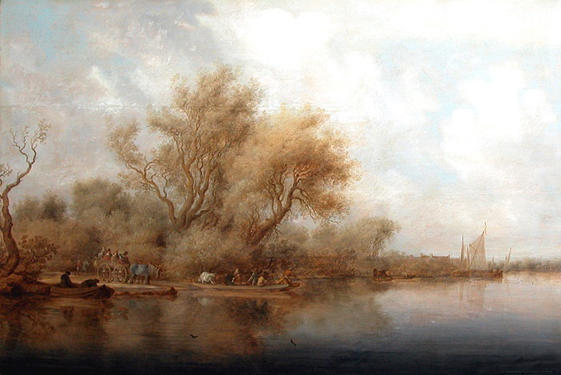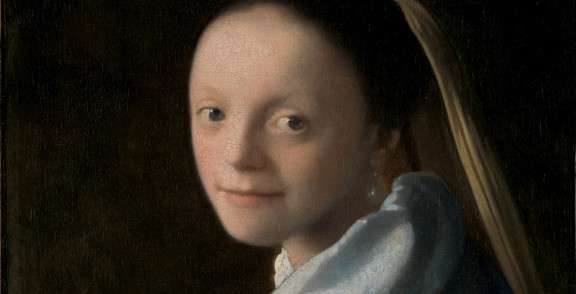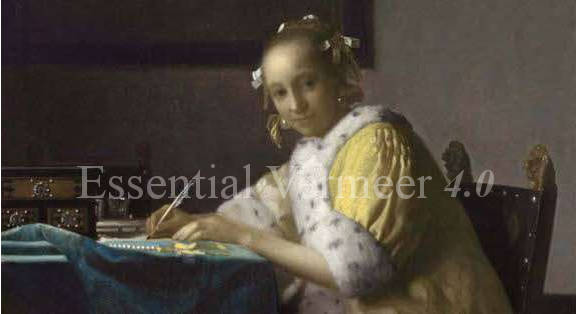The Arrival on the Bay
Solomon van Ruisdael1637
109 x 73 cm.
Musée du Louvre, Paris

RUYSDAEL, Salomon van
c. 1602, Naarden–1670, Haarlem
Dutch landscape painter of the Baroque style, uncle of the landscape artist Jacob van Ruisdael. Originally named de Goyer, as was his brother Isaak (also a painter and the father of Jacob van Ruisdael), Salomon entered the Haarlem Guild of St Luke in 1628. His first dated pictures are from 1627. He spent his whole life in Haarlem, where he was head of the guild in 1648. Van Ruisdael's early works—winter scenes—continue the tradition of Esaias van de Velde, and his early landscapes are based on the colour schemes and compositions of Pieter Molyn; it has been suggested that he may have studied with either or both painters. At least by 1628 he is mentioned as a landscape painter of Haarlem. Unlike certain other landscape painters of the period, his nephew among them, van Ruisdael generally painted actual landscapes of such places as Arnhem, Dordrecht, and Utrecht, sometimes combining motifs from different places in one picture. His early river landscapes of the 1630s, which are characterized by diagonal compositions of the dunes, are similar in composition and use of colour to the celebrated river scenes of his contemporary Jan van Goyen. Experts agree that van Ruisdael's most powerful work was done after 1645. His command of the landscape elements—great trees anchoring one side of the composition, distant views that draw the eye, and a vast expanse of sky and clouds—seems more assured, and his use of colour for effect more brilliant. From that point van Ruisdael became increasingly interested in light effects and decorative elements in his compositions. Critics have speculated that his change of style was in part owing to the influence of several Dutch painters (such as Jan Both) who were returning to Holland from study in Italy.
Many of van Ruisdael's later works are monumental in format and design, and they exhibit a masterly rendering of atmospheric effects. Though his landscapes are most characteristic of his work, between 1659 and 1662 van Ruisdael also painted a number of excellent still-l\ifes of game. His son Jacob Salomonszoon (1635–1681) was also a landscape artist.
- Willem van Aelst (2)
- Balthasar van der Ast (6)
- Hendrick Avercamp (3)
- Dirck van Baburen (7)
- Jacob Adriaenz. Backer (3)
- David Bailly
- Ludolf Bakhuysen
- Bartholomeus van Bassen
- Cornelis Bega
- Gerrit Berckheyde (2)
- Gillis Gillisz de Bergh
- Jan van Bijlert (7)
- Jan de Bisschop (2)
- Abraham Bloemaert (4)
- Pieter De Bloot
- Ferdinand Bol (3)
- Hans Bollinger
- Paulus Bor (2)
- Ambrosio Bosschaert (7)
- Jan Both
- Leonaert Bramer (4)
- Salomon de Bray (2)
- Quiringh van Brekelenkam (4)
- Jan Gerritszoon van Bronchorst (2)
- Adriaen Brouwer (5)
- Hendrick ter Brugghen (6)
- Hendrick van der Burch (5)
- Willem Buytewech (6)
- Abraham van Calraet (2)
- Jacob van Campen
- Jan van de Cappelle(3)
- Pieter Claesz (4)
- Pieter Codde (6)
- Adriaen Coorte (9)
- Josse van Craesbeeck (2)
- Aelbert Cuyp (6)
- Philip van Dijk
- Gerrit Dou (10)
- Willem Drost (2)
- Hendrick Dubbels
- Jacob Duck (4)
- Karel Dujardin (3)
- Willem Duyster (5)
- Gerbrand van den Eeckhout
- Pieter Jansens Elinga
- Cesar van Everdingen (5)
- Allaert van Everdingen
- Carel Fabritius (5)
- Goveart Flinck
- Frans Francken the Younger
- Aert de Gelder
- Cornelis Gijsbrechts
- Jan van Goyen (6)
- Frans Hals (3)
- Dirck Hals (5)
- Jan Davidsz. Heem (6)
- Maerten van Heemskerck
- Bartholomeus van der Helst (4)
- Jan van der Heyden (8)
- Meyndert Hobbema (3)
- Gerard van Honthorst (8)
- Pieter de Hooch (12)
- Van Hoogstraten (9)
- Gerard Houckgeest (4)
- Jan van Huysum (3)
- Willem Kalf (4)
- Jan van Kessel
- Philip Koninck (2)
- Gérard de Lairesse (5)
- Pieter Lastman
- Judith Jansdochter Leyster (5)
- Jan Lievens (4)
- Jacob van Loo (7)
- Nicolaes Maes (9)
- Cornelis de Man (5)
- Gabriel Metsu (12)
- Michiel Janz. van Mierevelt (3)
- Frans van Mieris (8)
- Jan Miense Molenaer (5)
- Pieter Molijn (2)
- Paulus Moreelse (2)
- Pieter Mulier
- Michiel van Musscher (5)
- Aert van der Neer (3)
- Eglon van der Neer (3)
- Caspar Netscher (5)
- Jacob Ochervelt (8)
- Jacob van Oost (2)
- Adriaen van Ostade (5)
- Antonie Palamedesz (6)
- Adam Pijnacker (5)
- Egbert van der Poel (2)
- Jan Porcellis (4)
- Pieter Symonz. Potter
- Paulus Potter (7)
- Pieter Jansz. Quast (2)
- Rembrandt van Rijn (complete oeuvre)
- Jacob van Ruisdael (8)
- Solomon van Ruisdael (7)
- Rachel Ruysch (2)
- Pieter Saenredam (3)
- Godfried Schalcken (6)
- Hercules Segers (2)
- Hendrick Sorg (4)
- Jan Steen (8)
- Harmen Steenwyck (3)
- Matthias Stom (2)
- Michael Sweerts (6)
- David Teniers the Younger
- Gerrit ter Borch (15)
- Willem van de Velde (7)
- Jacob van Velsen
- Johannes Verkolje (2)
- Jan Cornelisz Verspronck (4)
- Abraham de Verwer
- Simon de Vlieger
- Hendrick van Vliet (2)
- Daniel Vosmaer (4)
- Jacobus Vrel (8)
- Jacob van Walscapelle (2)
- Jan Baptist Weenix (2)
- Jan Wijnants (3)
- Emanuel de Witte (6)
- Philips Wouwermans (2)



